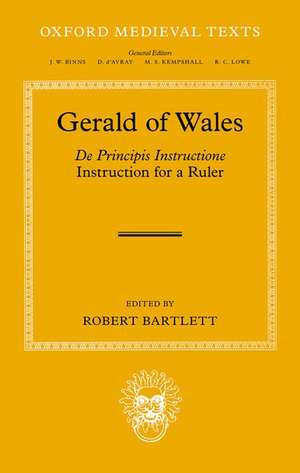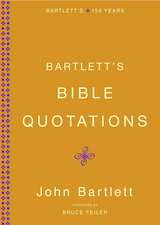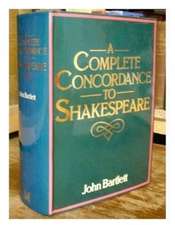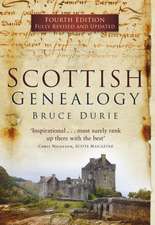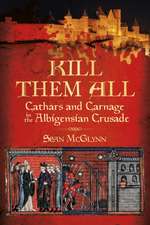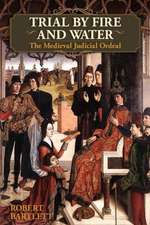Gerald of Wales: De Principis Instructione: Oxford Medieval Texts
Editat de Robert Bartletten Limba Engleză Hardback – 7 iun 2018
| Toate formatele și edițiile | Preț | Express |
|---|---|---|
| Paperback (1) | 87.65 lei 22-36 zile | +10.66 lei 5-11 zile |
| TEMPUS – oct 2006 | 87.65 lei 22-36 zile | +10.66 lei 5-11 zile |
| Hardback (1) | 1049.07 lei 31-37 zile | |
| OUP OXFORD – 7 iun 2018 | 1049.07 lei 31-37 zile |
Din seria Oxford Medieval Texts
- 30%
 Preț: 1094.95 lei
Preț: 1094.95 lei - 34%
 Preț: 951.60 lei
Preț: 951.60 lei - 34%
 Preț: 1131.72 lei
Preț: 1131.72 lei - 34%
 Preț: 1131.87 lei
Preț: 1131.87 lei - 34%
 Preț: 773.30 lei
Preț: 773.30 lei - 34%
 Preț: 1375.75 lei
Preț: 1375.75 lei - 34%
 Preț: 773.45 lei
Preț: 773.45 lei - 31%
 Preț: 588.91 lei
Preț: 588.91 lei - 34%
 Preț: 747.02 lei
Preț: 747.02 lei - 34%
 Preț: 597.04 lei
Preț: 597.04 lei - 34%
 Preț: 1373.11 lei
Preț: 1373.11 lei - 26%
 Preț: 489.14 lei
Preț: 489.14 lei - 34%
 Preț: 1343.58 lei
Preț: 1343.58 lei - 34%
 Preț: 1907.25 lei
Preț: 1907.25 lei - 34%
 Preț: 1536.23 lei
Preț: 1536.23 lei - 34%
 Preț: 1452.70 lei
Preț: 1452.70 lei - 34%
 Preț: 1623.89 lei
Preț: 1623.89 lei - 34%
 Preț: 1195.03 lei
Preț: 1195.03 lei - 34%
 Preț: 1154.35 lei
Preț: 1154.35 lei - 34%
 Preț: 1110.51 lei
Preț: 1110.51 lei - 34%
 Preț: 1446.05 lei
Preț: 1446.05 lei - 34%
 Preț: 1109.33 lei
Preț: 1109.33 lei - 34%
 Preț: 1374.72 lei
Preț: 1374.72 lei - 34%
 Preț: 1200.78 lei
Preț: 1200.78 lei - 34%
 Preț: 1385.62 lei
Preț: 1385.62 lei - 34%
 Preț: 932.45 lei
Preț: 932.45 lei - 34%
 Preț: 1343.00 lei
Preț: 1343.00 lei - 34%
 Preț: 1966.64 lei
Preț: 1966.64 lei - 34%
 Preț: 1063.37 lei
Preț: 1063.37 lei - 34%
 Preț: 1152.71 lei
Preț: 1152.71 lei - 34%
 Preț: 815.39 lei
Preț: 815.39 lei - 34%
 Preț: 1584.39 lei
Preț: 1584.39 lei - 34%
 Preț: 1113.51 lei
Preț: 1113.51 lei - 34%
 Preț: 1051.38 lei
Preț: 1051.38 lei - 34%
 Preț: 1376.89 lei
Preț: 1376.89 lei - 34%
 Preț: 1504.17 lei
Preț: 1504.17 lei - 34%
 Preț: 1345.75 lei
Preț: 1345.75 lei - 34%
 Preț: 1536.33 lei
Preț: 1536.33 lei - 34%
 Preț: 1108.40 lei
Preț: 1108.40 lei - 34%
 Preț: 1621.96 lei
Preț: 1621.96 lei - 34%
 Preț: 1050.00 lei
Preț: 1050.00 lei - 31%
 Preț: 1169.41 lei
Preț: 1169.41 lei - 31%
 Preț: 375.81 lei
Preț: 375.81 lei - 34%
 Preț: 2061.97 lei
Preț: 2061.97 lei - 50%
 Preț: 1007.49 lei
Preț: 1007.49 lei - 34%
 Preț: 1330.88 lei
Preț: 1330.88 lei - 34%
 Preț: 1432.21 lei
Preț: 1432.21 lei
Preț: 1049.07 lei
Preț vechi: 1516.96 lei
-31% Nou
Puncte Express: 1574
Preț estimativ în valută:
200.76€ • 208.33$ • 167.80£
200.76€ • 208.33$ • 167.80£
Carte tipărită la comandă
Livrare economică 05-11 martie
Preluare comenzi: 021 569.72.76
Specificații
ISBN-13: 9780198738626
ISBN-10: 0198738625
Pagini: 872
Dimensiuni: 147 x 223 x 54 mm
Greutate: 1.2 kg
Editura: OUP OXFORD
Colecția OUP Oxford
Seria Oxford Medieval Texts
Locul publicării:Oxford, United Kingdom
ISBN-10: 0198738625
Pagini: 872
Dimensiuni: 147 x 223 x 54 mm
Greutate: 1.2 kg
Editura: OUP OXFORD
Colecția OUP Oxford
Seria Oxford Medieval Texts
Locul publicării:Oxford, United Kingdom
Recenzii
[A] pleasing addition to the wonderful Oxford Medieval Text series.
It is a testament to Gerald's skill as a writer, and to the strength of his personality, that he manages to maintain a lively authorial voice amidst such a dense collection of quotations. Bartlett provides useful apparatus for the reader to navigate this characteristically discursive style ... With this new focus on Gerald as an author and serious consideration given to his sources and interests, Bartlett opens up questions of Gerald's composition habits and lays the groundwork for future studies of his style, sources, and interests -- including, for example, his habit of quoting himself. With this exceptional edition in hand, future scholars interested in Gerald as author are already halfway there.
Bartlett makes accessible an important work by Gerald, in a new improved edition, with detailed commentary, and full translation. This thereby makes possible a very comfortable access to one of the most enigmatic British authors of the late 12th century ... for experts as well as beginners there is a detailed commentary, a bibliography, and an Index of sources and a General Index.
Robert Bartlett's massive labour of love and research into this comprehensive and definitive edition... Few would contest the fact that Bartlett is the historian for the job, having spent a life-time in Gerald's literary presence, and being the first major biographer of Gerald with his Gerald of Wales: A Voice of the Middle Ages in 1982 (revised in 2006). The result is an invaluable and hugely impressive work of deep and enduring scholarship.
This volume provides us with the first edition and translation of the complete work, informed by the editor's considerable knowledge of Gerald's life and works, and executed according to the high editorial standards one expects from the Oxford Medieval Texts series. We are now able to appreciate for the first time the idiosyncratic qualities of Gerald's 'mirror for princes' and the sources upon which he drew, while reading as never before Gerald's powerful and personally charged account of the downfall of King Henry II.
Bartlett's full edition is based on the single fourteenth-century manuscript with a complete version of De principis instructione, representing Gerald's second, revised edition: British Library, Cotton MS Julius B XIII, folios 48–173. Gerald described his monumental scholarly endeavours as 'restoring myself to myself'; appropriately, Bartlett devotes a section of his introduction to 'Gerald's use of himself', which traces material that Gerald copied or adapted from his other works, which include letters, hagiography, an account of the late twelfth-century conquest of Ireland, and works on the land and legends of Ireland and Wales.
The Introduction, Text and Translation are flawless and therefore exemplary, accompanied by an extensive commentary and succinct informative notes on the Latin text, a register of sources and the secondary literature; and various Indices conclude this magnificent volume. One can say without exaggeration of Bartlett's new edition that this late work of Gerald can now for the first time be appropriately read and understood ... As so often in the history of the Latin middle ages, once more the slender transmission of the text implies nothing about its literary merit and its importance as a historical source ... It is to be hoped that Medieval Studies can learn what various possibilities for further research are offered by Bartlett's excellent new edition.
Bartlett's translation is competent and accurate ... His introduction is lucid, concise, and thorough. This book is a scholarly achievement, the culmination of decades of work on Gerald and on medieval British history more broadly. It would suit the shelf of anyone interested in Gerald, medieval Britain, twelfth-century court culture, or the Angevins.
With this exceptional edition in hand, future scholars interested in Gerald as author are already halfway there.
It is a testament to Gerald's skill as a writer, and to the strength of his personality, that he manages to maintain a lively authorial voice amidst such a dense collection of quotations. Bartlett provides useful apparatus for the reader to navigate this characteristically discursive style ... With this new focus on Gerald as an author and serious consideration given to his sources and interests, Bartlett opens up questions of Gerald's composition habits and lays the groundwork for future studies of his style, sources, and interests -- including, for example, his habit of quoting himself. With this exceptional edition in hand, future scholars interested in Gerald as author are already halfway there.
Bartlett makes accessible an important work by Gerald, in a new improved edition, with detailed commentary, and full translation. This thereby makes possible a very comfortable access to one of the most enigmatic British authors of the late 12th century ... for experts as well as beginners there is a detailed commentary, a bibliography, and an Index of sources and a General Index.
Robert Bartlett's massive labour of love and research into this comprehensive and definitive edition... Few would contest the fact that Bartlett is the historian for the job, having spent a life-time in Gerald's literary presence, and being the first major biographer of Gerald with his Gerald of Wales: A Voice of the Middle Ages in 1982 (revised in 2006). The result is an invaluable and hugely impressive work of deep and enduring scholarship.
This volume provides us with the first edition and translation of the complete work, informed by the editor's considerable knowledge of Gerald's life and works, and executed according to the high editorial standards one expects from the Oxford Medieval Texts series. We are now able to appreciate for the first time the idiosyncratic qualities of Gerald's 'mirror for princes' and the sources upon which he drew, while reading as never before Gerald's powerful and personally charged account of the downfall of King Henry II.
Bartlett's full edition is based on the single fourteenth-century manuscript with a complete version of De principis instructione, representing Gerald's second, revised edition: British Library, Cotton MS Julius B XIII, folios 48–173. Gerald described his monumental scholarly endeavours as 'restoring myself to myself'; appropriately, Bartlett devotes a section of his introduction to 'Gerald's use of himself', which traces material that Gerald copied or adapted from his other works, which include letters, hagiography, an account of the late twelfth-century conquest of Ireland, and works on the land and legends of Ireland and Wales.
The Introduction, Text and Translation are flawless and therefore exemplary, accompanied by an extensive commentary and succinct informative notes on the Latin text, a register of sources and the secondary literature; and various Indices conclude this magnificent volume. One can say without exaggeration of Bartlett's new edition that this late work of Gerald can now for the first time be appropriately read and understood ... As so often in the history of the Latin middle ages, once more the slender transmission of the text implies nothing about its literary merit and its importance as a historical source ... It is to be hoped that Medieval Studies can learn what various possibilities for further research are offered by Bartlett's excellent new edition.
Bartlett's translation is competent and accurate ... His introduction is lucid, concise, and thorough. This book is a scholarly achievement, the culmination of decades of work on Gerald and on medieval British history more broadly. It would suit the shelf of anyone interested in Gerald, medieval Britain, twelfth-century court culture, or the Angevins.
With this exceptional edition in hand, future scholars interested in Gerald as author are already halfway there.
Notă biografică
Robert Bartlett is Bishop Wardlaw Professor of Mediaeval History at the University of St Andrews and a Fellow of the British Academy. He received his university education at Cambridge, Oxford, and Princeton, and has taught at the universities of Edinburgh and Chicago. His books include The Making of Europe: Conquest, Colonization and Cultural Change 950-1350, which won the Wolfson Literary Prize for History; England under the Norman and Angevin Kings 1075-1225; and Why Can the Dead Do Such Great Things?: Saints and Worshippers from the Martyrs to the Reformation. He has also written and presented three television series for the BBC, Inside the Medieval Mind, The Normans, and The Plantagenets.
